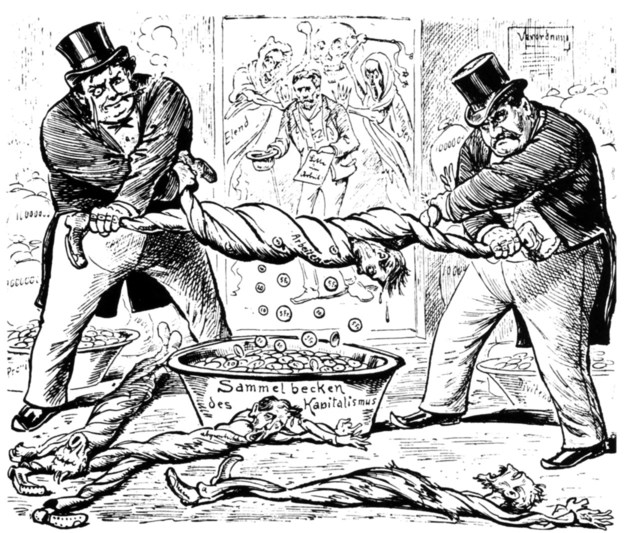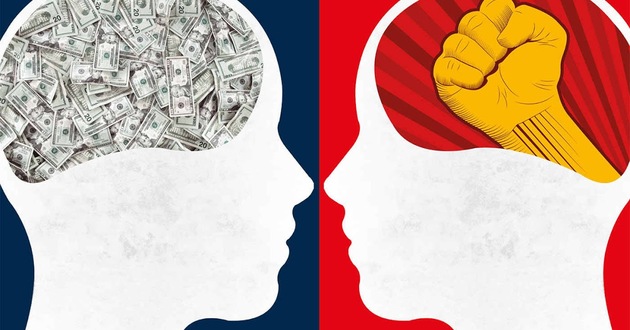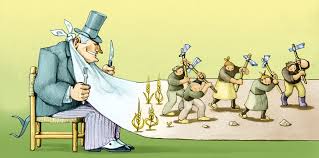The capitalism is an economic and social system based on private property and the accumulation of capital.
It emerged in the 15th century, in the transition from the Middle Ages to the Modern Age, from the decline of the feudal system and the birth of a new social class, the bourgeoisie.
resume
Capitalism emerged in Western Europe due to changes in the feudal system. With the centralization of power in the hands of the king and the rise of the bourgeoisie, society has undergone a major transformation.
There were several changes in the mode of production, an increase in urbanization, in the emergence of new manufacturing techniques that allowed cheaper goods.
We still have the improvement of communications and means of transportation that facilitated the arrival of these products to distant territories.
It is important to remember that capitalism, as we know it today, has undergone several changes, but it has always been based on profit.
Definition
The word capital comes from the Latin capitale and means “head”, in which it alludes to the heads of cattle, that is, one of the measures of wealth in ancient times.
It can also relate to the head in its rational sense, that is, the head as an upper part of the body that thinks and commands the other parts.
There is also another definition that refers to the capital of a state or country, that is, the city where the administration and direction of public affairs are concentrated.
Phases of Capitalism
We can say that capitalism has historically been divided into three phases. Are they:
- Commercial or Mercantile Capitalism (pre-capitalism)
- Industrial Capitalism or Industrialism
- Financial or Monopoly Capitalism
Commercial Capitalism
Pre-capitalism or commercial capitalism, also called mercantilism , was in force from the 15th to the 18th centuries.
At this time, Europe is undergoing the transition from feudalism to capitalism . Land ceases to be the most important source of wealth to become a good that can be sold like any other.
Thus, the main purpose of commercial capitalism was to accumulate capital through trade, a favorable trade balance and the conquest of colonies.
Industrial Capitalism
Industrial Capitalism or Industrialism emerged with the Industrial Revolution in the 18th century, from the transformation of the production system.
In this case, there was a change in the way of manufacturing manufactured products. Before, each product was made by hand, in small quantities. With the emergence of the steam engine and more elaborate machines, we move to large production scales.
In this way, Industrial Capitalism focuses on the development of the factory production system. This will need more manpower and in this way the working class appears.
Financial or Monopoly Capitalism

Finally, financial capitalism, started in the 20th century, consolidated with the First World War, is still in force today.
Financial capitalism is based on the laws of banks, companies and large corporations through industrial and financial monopoly.
Therefore, this third phase of capitalism is known as Monopoly Financial Capitalism . It is important to note that industries and businesses still profit, but are controlled by the economic power of commercial banks and other financial institutions.
Few and large companies have come to dominate the market through trusts , holdings and cartels.
Based on the phenomenon of globalization, some scholars defend the theory that capitalism is already in a new phase of development, called informational capitalism .
Liberalism
In the eighteenth century, with the changes produced in the political and economic systems, several theorists appeared, who intend to explain the functioning of the economy and, consequently, of capitalism.
One of the most important, without a doubt, was Adam Smith . The Scots theorized about the role of the state in the economy which should be its function within the economic system.
In this way, two currents arise:
- Liberalism : defends that State interference should be minimal, being responsible only for regulating the economy, collecting taxes and taking care of the citizens’ well-being.
- Anti-liberalism or interventionist : believes that the economy must be planned from the State, which would set prices, establish monopolies and regulations.
Characteristics of Capitalism
These are the main characteristics of capitalism:
- Private property;
- Profit;
- Accumulation of wealth;
- Salaried work;
- Control of productive systems by private owners and the State.
Socialism x Capitalism

As a way of opposing capitalism, several ideas appeared that contest this system such as socialism and anarchism .
For the purposes of studies, we will analyze only Socialism , which emerged in the 18th century. Socialist doctrine can be divided:
- Utopian Socialism , by Robert Owen , Saint-Simon and Charles Fourier
- Scientific Socialism , by Karl Marx and Friedrich Engels .
Since communism and socialism are based on economic equality, concepts are often treated as synonyms.
The communism , however, is not really a system, but an ideology. The goal of communism is a society without the existence of social classes, when the working class will assume the predominant role in social organization. Thus, through socialism, communism is sought.
Criticisms of Capitalism
The main criticisms that left-wing theorists make of capitalism are regarding private property, as this would be the source of injustice in the world.
Equally, socialism sees exploitation of workers as one of the greatest evils of capitalism. Requiring maximum production with the minimum counterpart, the investor’s profit would only increase and social inequality would deepen.
Socialists claim that a capitalist society will always be subject to crises as it was in 1929. Therefore, only a system based on social equality would be able to end these problems.

